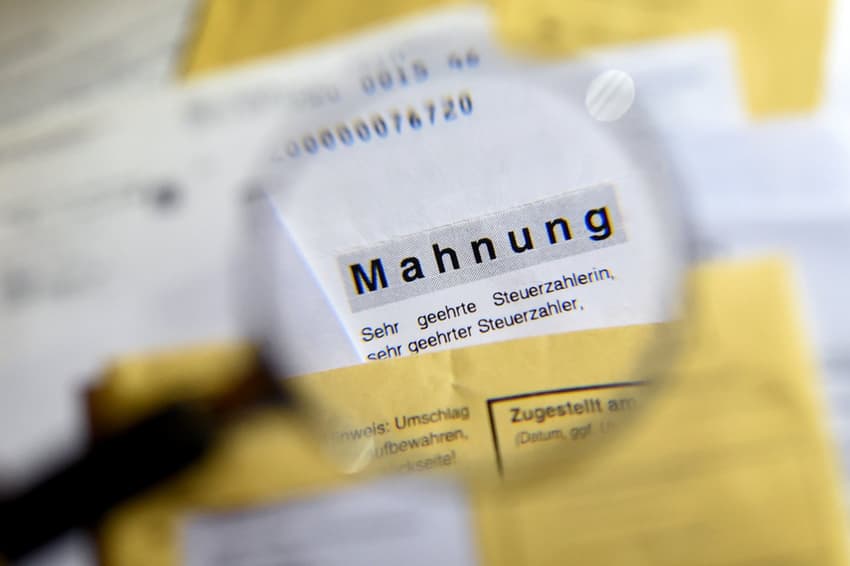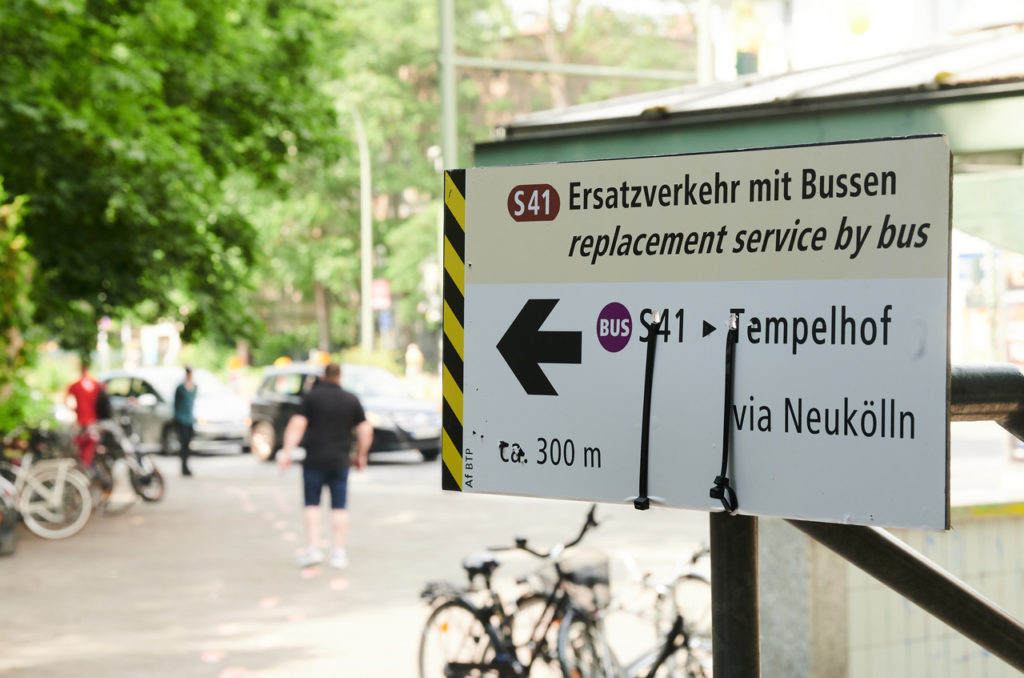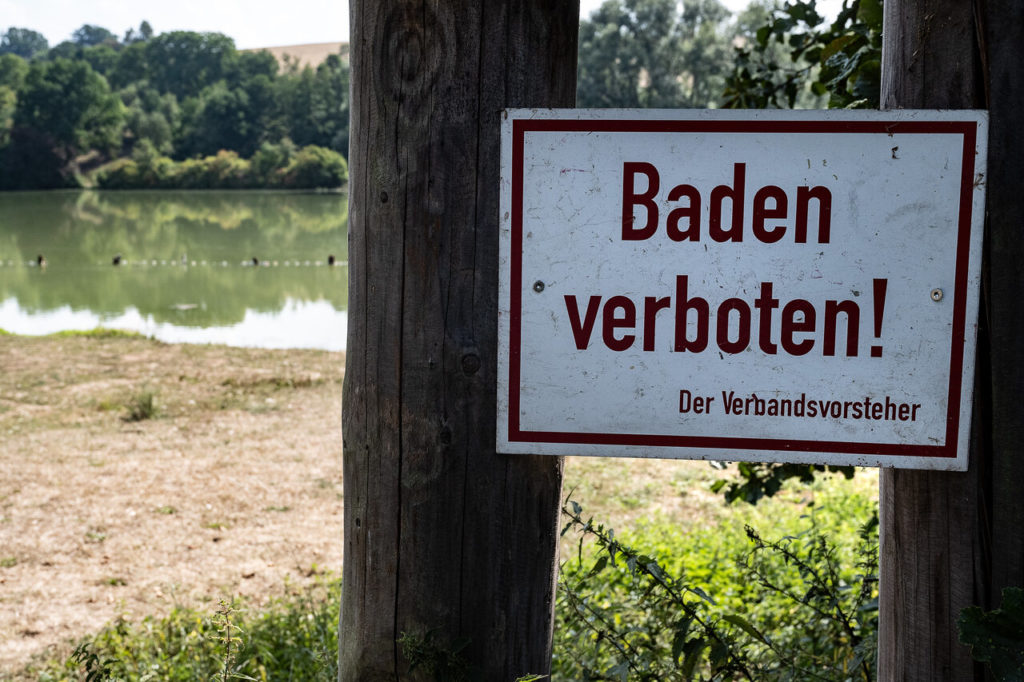7 German words that make my blood run cold

Local Reporter Sarah Magill breaks down the German words that strike terror into her heart.
The German language itself can be pretty scary. As many a humorous Youtube video points out, to the untrained ear, it can sound extremely harsh and of course, it’s a notoriously difficult language to learn.
But once you get to know the language a bit better, you will start to realise that it has a certain beauty and an extremely useful and unparalleled ability to describe things with absolute precision.
That being said, there are a few words, which when I see or hear them, make me break out in a sweat.
Mahnung
Meaning “notice” or “warning” in English, this is not a word I’ve ever come across in a positive context.
Usually, it’s to be found at the top of a letter “reminding” (or rather “warning”) me that I’ve forgotten or neglected to pay for something.
READ ALSO: The seven stages of learning German every foreigner goes through
Seeing this relatively short German word always brings with it a stab of fear, mixed with irritation with myself and whoever my financial pursuers happen to be.
Usually though, once the fear has subsided, I realise it’s just a simple case of making a transfer of whatever is owed to ensure no other Mahnungen follow.
Vollstreckungsankündigung
If you ignore or overlook a couple of Mahnungen – don’t be surprised if you find this seven-syllabled monster waiting for you in your post box.
Meaning “Notification of Enforcement” this type of letter means things are about to get serious – if you don’t hurry up and pay.
Though the couple of occasions I’ve received such a letter have involved some temporary heart stoppage, as with a Mahnung, the terror subsided after a few minutes when I realised that, the trouble usually disappears by just paying straight away.
Ersatzverkehr
Most commuters in Germany will be familiar with this word, which is a precursor to inconvenience and temporary misery.
Meaning "Replacement transport", Ersatzverkehr appears on notice boards and train timetables to announce that the usual service is suspended - often for construction works - and in the meantime, you have to take the replacement bus. Because it's always a bus.

An information sign for a replacement bus service stands at the Treptower Park S-Bahn station in Berlin, June 2020. Photo: picture alliance/dpa | Annette Riedl
It's usually a crowded bus too. My own last, and worst, experience with such a service involved clutching onto a support bar for dear life with an outstretched arm above a pensioner's head for 45 minutes as a replacement bus tore through country roads in Brandenburg.
READ ALSO: '6 German words I now use in English'
That's why Ersatverkehr is truly the stuff of nightmares.
Polizei Einsatz
In Berlin, these words appear on train station signs and in announcements on a not so infrequent basis. Meaning "Police operation" this phrase usually means that the police have been called out to assist with some misbehaving members of the public and that indefinite delays will follow.
The initial fear induced by this word is, therefore, usually replaced by extreme irritation.
Verboten
This word is designed to instill fear in the same way its English counterpart “forbidden” is. But while “forbidden” seems to be mainly confined to fairy tales in the English language, in Germany, you'll see Verboten in many, many places.

A sign reading "Bathing prohibited!" is posted in front of the bathing area at Wendebachstaussee lake in the district of Göttingen in August 2022, due to accumulations of toxic blue-green algae. Photo: picture alliance/dpa | Swen Pförtner
It's a harsh-sounding word that carries with it a strong implication of punishment *shivers*.
Ausweis
This may sound like a strange one as, really, Ausweis - meaning “Identification” - is a fairly innocuous word.
But in my own head, it's taken on a more sinister meaning and always brings me out in a sweat. When I'm asked for my Ausweis in German, I feel like I’ve done something wrong and start to panic.
It might also be because I still haven’t bothered to get an official German ID card and am usually winging it, hoping my driver’s license will suffice.
Meldepflicht
This word combines the German love for an Anmeldung ("registration") with the heavy burden of a Pflicht ("duty"), to produce another scary word that announces an impending bureaucratic procedure.
One such well-known, and widely feared, Meldepflicht is the so-called Anmeldungspflicht - the duty to register your home address with your local district office. This must be done in person and within two weeks of moving address. Depending on where you live, it can be a long wait to get an appointment. But that's no excuse!
Comments
See Also
The German language itself can be pretty scary. As many a humorous Youtube video points out, to the untrained ear, it can sound extremely harsh and of course, it’s a notoriously difficult language to learn.
But once you get to know the language a bit better, you will start to realise that it has a certain beauty and an extremely useful and unparalleled ability to describe things with absolute precision.
That being said, there are a few words, which when I see or hear them, make me break out in a sweat.
Mahnung
Meaning “notice” or “warning” in English, this is not a word I’ve ever come across in a positive context.
Usually, it’s to be found at the top of a letter “reminding” (or rather “warning”) me that I’ve forgotten or neglected to pay for something.
READ ALSO: The seven stages of learning German every foreigner goes through
Seeing this relatively short German word always brings with it a stab of fear, mixed with irritation with myself and whoever my financial pursuers happen to be.
Usually though, once the fear has subsided, I realise it’s just a simple case of making a transfer of whatever is owed to ensure no other Mahnungen follow.
Vollstreckungsankündigung
If you ignore or overlook a couple of Mahnungen – don’t be surprised if you find this seven-syllabled monster waiting for you in your post box.
Meaning “Notification of Enforcement” this type of letter means things are about to get serious – if you don’t hurry up and pay.
Though the couple of occasions I’ve received such a letter have involved some temporary heart stoppage, as with a Mahnung, the terror subsided after a few minutes when I realised that, the trouble usually disappears by just paying straight away.
Ersatzverkehr
Most commuters in Germany will be familiar with this word, which is a precursor to inconvenience and temporary misery.
Meaning "Replacement transport", Ersatzverkehr appears on notice boards and train timetables to announce that the usual service is suspended - often for construction works - and in the meantime, you have to take the replacement bus. Because it's always a bus.

It's usually a crowded bus too. My own last, and worst, experience with such a service involved clutching onto a support bar for dear life with an outstretched arm above a pensioner's head for 45 minutes as a replacement bus tore through country roads in Brandenburg.
READ ALSO: '6 German words I now use in English'
That's why Ersatverkehr is truly the stuff of nightmares.
Polizei Einsatz
In Berlin, these words appear on train station signs and in announcements on a not so infrequent basis. Meaning "Police operation" this phrase usually means that the police have been called out to assist with some misbehaving members of the public and that indefinite delays will follow.
The initial fear induced by this word is, therefore, usually replaced by extreme irritation.
Verboten
This word is designed to instill fear in the same way its English counterpart “forbidden” is. But while “forbidden” seems to be mainly confined to fairy tales in the English language, in Germany, you'll see Verboten in many, many places.

It's a harsh-sounding word that carries with it a strong implication of punishment *shivers*.
Ausweis
This may sound like a strange one as, really, Ausweis - meaning “Identification” - is a fairly innocuous word.
But in my own head, it's taken on a more sinister meaning and always brings me out in a sweat. When I'm asked for my Ausweis in German, I feel like I’ve done something wrong and start to panic.
It might also be because I still haven’t bothered to get an official German ID card and am usually winging it, hoping my driver’s license will suffice.
Meldepflicht
This word combines the German love for an Anmeldung ("registration") with the heavy burden of a Pflicht ("duty"), to produce another scary word that announces an impending bureaucratic procedure.
One such well-known, and widely feared, Meldepflicht is the so-called Anmeldungspflicht - the duty to register your home address with your local district office. This must be done in person and within two weeks of moving address. Depending on where you live, it can be a long wait to get an appointment. But that's no excuse!
Join the conversation in our comments section below. Share your own views and experience and if you have a question or suggestion for our journalists then email us at [email protected].
Please keep comments civil, constructive and on topic – and make sure to read our terms of use before getting involved.
Please log in here to leave a comment.